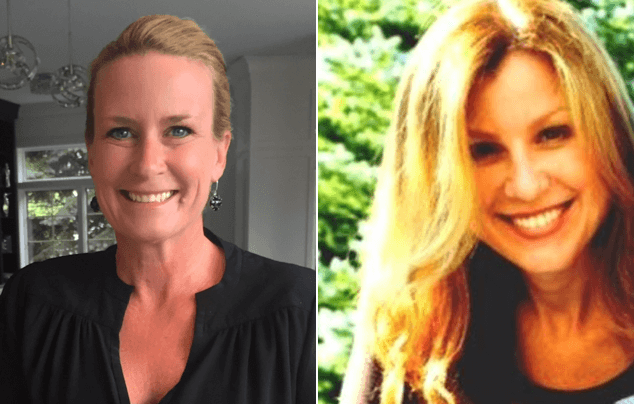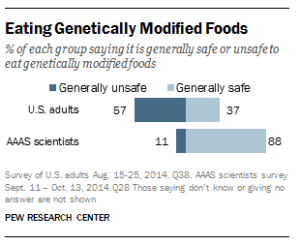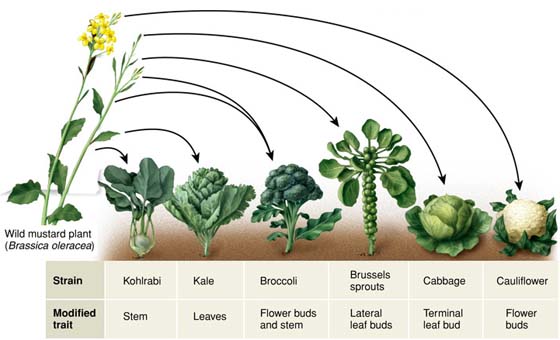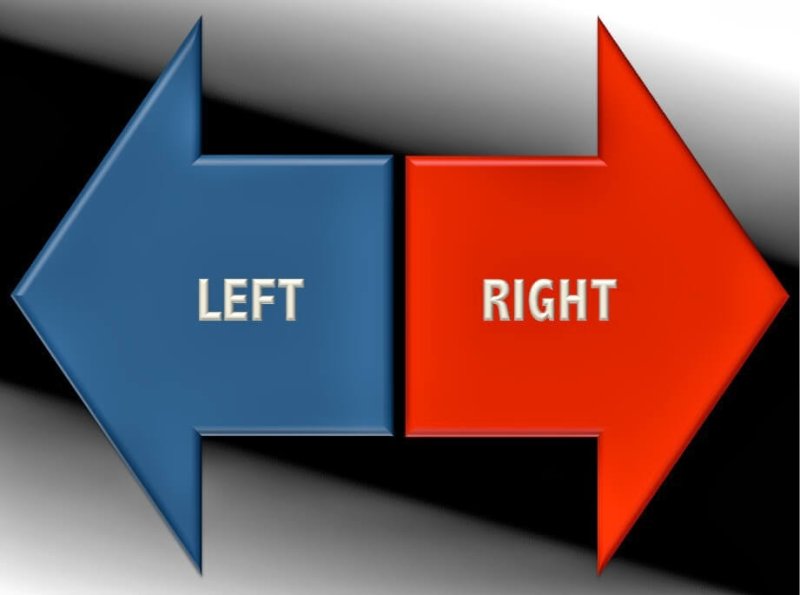There are three subjects you should avoid at dinner parties – religion, politics and GMOs. The latter is usually a tinderbox that can inflame even the most docile soul, regardless of political affiliation. If confronted with such a situation, carefully redirect the conversation to something less controversial, like maybe healthcare or immigration reform.
Fortunately, GMOs are not always divisive. It brought together the two of us – a conservative mom from suburban Chicago and a liberal mom from Atlantic Beach, Florida – and we’ve become passionate defenders of genetic engineering.

Our interest and advocacy about GMOs led us to discover a relatively new movement called ecomodernism. Ecomodernists believe modern technologies like GMOs can help mitigate some of the effects of climate change regardless of whether you believe it’s human-induced or it’s not.
We figured if GMOs and an environmental movement can unite us and make us feel hope for the future, maybe there’s a chance others could feel the same way. Here is our story:
Julie Kelly
As recently as one year ago, I never would have connected with Amy Levy. I was a proud hold-out to social media like Facebook and Twitter, confident I could lead a full, interesting life without looking at vacation photos from high school classmates I haven’t seen since 1986 or Kardashian hashtags.
That all changed a year ago when I wrote a Wall Street Journal op-ed about the politics of a certain celebrity chef (I won’t reveal his name, but it rhymes with Dom Schmoliccio). The piece set off a brief firestorm I hadn’t anticipated and compelled me to finally set up a Twitter account to respond to the criticism.
I’m glad I did. Not only is Twitter an unending source of information you can’t find anywhere else, it’s a great outlet to pick random fights with complete strangers over a glass (ok, bottle) of wine. My background is in politics, but I had started teaching cooking classes out of my home, so writing about food policy issues became a great convergence of both. The issue of GMOs — genetically modified organisms — kept popping up; I did some research and it wasn’t long before I was convinced that consumers were largely being misinformed about the issue. I decided to start writing about this technology to help tell the real story that most people – especially moms — were not being told.
Around the same time, Amy — a liberal stay-at-home mom in Florida — also took to her computer to vent about some of the same issues, including the anti-vax crusade and smear attacks on pro-GMO scientists. Despite our political differences, we found plenty of common ground and became “virtual” buddies. We are passionate advocates for complicated issues. We are completely unconnected to any entrenched interest (i.e., we work for free). We can silence a friendly neighborhood cocktail party with two words: RoundUp Ready. And our DMs on Twitter are hilarious.
Amy Levy
As recently as one year ago, I never would have connected with Julie Kelly because I was way too busy hanging out on Twitter and talking about David Cook. Yes, the one from American Idol. (I can’t be the only mom, housebound with new babies, who found weird ways to pass the time. And David Cook is great, I swear.)
When the babies started school, I regenerated a few brain cells I lost from sleep deprivation (and watching American Idol) and started paying attention to world issues again. I’ve always been a very pro-science, evidence-based person. Mystics and fairies are not for me. I’m firmly on the side of  science when it comes to vaccines, evolution, climate-change, etc. so when I read this Pew Research report published last January, I did a double-take at the scientific consensus on GMOs: 88 percent of scientists affiliated with the American Association for the Advancement of Science — our country’s most prestigious independent science group — scientists say GM foods are safe. That’s a stronger consensus than the 87 percent who say climate change is due mostly to human activity.
science when it comes to vaccines, evolution, climate-change, etc. so when I read this Pew Research report published last January, I did a double-take at the scientific consensus on GMOs: 88 percent of scientists affiliated with the American Association for the Advancement of Science — our country’s most prestigious independent science group — scientists say GM foods are safe. That’s a stronger consensus than the 87 percent who say climate change is due mostly to human activity.
I was blown away that science considers GMOs safe because I had always assumed they were bad, mostly I guess, because of the cute little Non-GMO Project label with the butterfly (a meaningless but powerful label, I learned). I was never fanatically anti-GMO but I definitely congratulated myself for buying organic Cheddar Bunnies instead of Goldfish crackers for my kids. I’m a little ashamed at my smugness. If I had compared the nutrition labels, I would have seen that the expensive bunnies had more sugar, more fat and far fewer nutrients. I just figured that organic, non-GMO meant they were a healthy snack.
After the Pew report was released, I started digging into the GMO issue and became obsessed. Genetic engineering is a fascinating technology with incredible humanitarian potential. The more I learn about it, the more excited I get. I’m not sure I should admit this (I’ve already admitted the David Cook thing though, so what the hell), but sometimes I’ll try to come up with my own ideas for new transgenic applications. Some housewives daydream about hot gardeners; I like to think of cool things to do to corn genes (I did not mean for that to sound dirty).
By the way, Julie and I both have a talent for working GMOs into casual conversation. I don’t know about her husband, but mine is getting a teensy bit sick of it.
Julie Kelly
My entire family is fed up with GMOs. My youngest daughter asked for suggestions about a current events project and pleaded, “Don’t say GMOs!” My teen daughter must secretly eat Chipotle at a friend’s house because it’s verboten here.
But Amy, to your point, it’s easy to become obsessed with this issue. First, nearly everything we eat
today has been genetically modified. I remember one of the first graphics I saw about GMOs was how veggies like kale and broccoli originated from a wild mustard plant.
 Even my favorite fruit – the Ruby Red grapefruit – is the result of a weird process known as mutagenesis that uses radiation to literally blow holes in chromosomes, changing the genetic composition of plants. Oh yes: Ruby Red grapefruits (or any of the other 2500 other plants mutagenized by radiation or highly toxic chemicals over years of manipulation in laboratories) can be and frequently are marketed as “certified organic”.
Even my favorite fruit – the Ruby Red grapefruit – is the result of a weird process known as mutagenesis that uses radiation to literally blow holes in chromosomes, changing the genetic composition of plants. Oh yes: Ruby Red grapefruits (or any of the other 2500 other plants mutagenized by radiation or highly toxic chemicals over years of manipulation in laboratories) can be and frequently are marketed as “certified organic”.
The lesson here is that genetic engineering is just a modern approach to plant breeding that has been around for eons. Just like science is now unlocking some of the secrets of our own DNA, scientists are doing the same with plants. The potential benefits are nothing short of mind-blowing. GMOs are a huge benefit to farmers because those crops have higher yields, use fewer resources like water and chemicals and require less land than conventional or organic farming. They cut back on insecticide use because the crops are bred to fight off pests innately. The technology can help cut down on food waste by preventing browning/bruising in apples or spoilage in potatoes.
But where Amy and I really connected is because of our passion for how genetic engineering can potentially help people not as fortunate as we are. We’re both the mother of two (I have girls, she has boys) and — like most parents – feel deep sadness about suffering children around the world. When you have modern technology that can ease the plight of subsistence farmers who live in hostile growing climates as well as fortify staple food with micronutrients to help stave off hunger, blindness, malnutrition, and even death, no one should argue against that- least of all the rich, well-fed, sanctimonious culinary elite in this country who charge $280 for a steak at their restaurants (yes, that’s you Schmoliccio). That’s when our Tiger Mamas really come out.
Our advocacy for GMOs soon led us to ecomodernism, which is an interesting new approach to the climate change movement, a cause that I have intentionally avoided for that last two decades. I came across a tweet from Michael Shellenberger and it had something that caught my eye – a cute profile picture – so I clicked. One of the founders of ecomodernism, Shellenberger diverged from the traditional environmental movement out of frustration that is wasn’t forward-thinking enough.
I discovered that ecomodernism has a refreshing agenda to address climate change. It moves beyond the blame game that turns off so many people on the right, like me. It celebrates, not condemns, human achievement and progress. And it believes that emerging technologies like GMOs can not only help save the planet, but also save hundreds of millions of people around the world from a life of misery due to poverty, malnutrition, and lack of access to the modern world. It’s pro-growth, pro-humanity and pro-planet. Kind of like Al Gore and Milton Freidman had a baby.
It was funny because I remember having to re-read some of Michael’s stuff because I was thinking, “why is this environmentalist talking about nuclear power”? It was completely inimical to what I had always believed about environmental activists.
Amy Levy
Julie — remind me to make fun of you later about the cute profile picture thing.
Bill Gates is really the one who made me start looking at nuclear energy differently. Before that, I was reflexively anti-nuclear for no other reason than I didn’t know anything about it or maybe because Mother Jones said I should be. Gates did a fantastic TED Talk back in 2010 about what it will take to get to zero carbon emissions and the future of nuclear technology – fourth generation reactors are unbelievable. I respect Bill Gates as a humanitarian so I was willing to take a look at it after his talk.
Once I set aside emotion and looked at it rationally, nuclear started to seem like a no-brainer in combating climate change. And even if you don’t think climate change is an urgent issue, it would still make a huge difference in terms of human and environmental health to go in that direction. Millions of people die every year from conditions related to burning fossil fuel, wood, and dung. Everyone wants reliable electricity, including the developing world where energy poverty is a serious issue. I’m not opposed to wind and solar but from a practical standpoint, they don’t come close to what nuclear can deliver.
Learning about nuclear energy is a lot like learning about GMOs, you have to look for good information which is hard to find on the Internet. Greenpeace has done a great job scaring people about nuclear. They are often cited as a reputable source by the press but their information doesn’t jive with what respectable scientific bodies are reporting. Here’s just one powerful brief from NASA: Coal and Gas are Far More Harmful than Nuclear Power. The fear is understandable but if we’re serious about zero-carbon energy, we have to get past the Greenpeace hysteria and look at it rationally.
I read An Ecomodernist Manifesto back in April and it resonated with me so much, probably because I was already a fan of GMOs and had been pro-nuclear for awhile. Ecomodernism makes sense to me. It’s evidence-based, pragmatic, and above all, pro-human. I wasn’t thinking about it in terms of a movement or that I even had a role in it. I just liked it so I started sharing it with friends. It wasn’t until I noticed how loud and powerful the anti-science voices were on the Internet that I decided I had to speak up.
Julie and Amy
So now, we’re both spending our days thinking about how to get the message out about ecomodernism and science in general. We’re almost as passionate about it as the people who have spent their careers on these issues but we have the advantage of being outsiders so we can see where the communication is faltering. The scientists, environmentalists, and journalists we interact with are brilliant but sometimes they are so busy arguing with one another, they forget that most people don’t think about climate change or GMOs 24/7. We’re hoping to help translate the messages into relatable language in order to reach more eyes and ears because really – if the discussion never leaves the small circle of shouting experts, nothing big will ever be accomplished.
We joke that we’re the sorority girls who hook up (metaphorically speaking) with the smart kids at the end of Revenge of the Nerds but it could be the unlikely alliances that make the biggest difference.
Julie Kelly is a food writer and cooking teacher in Orland Park, IL. She can be reached on Twitter @Julie_kelly2
Amy Porterfield Levy is a mother and writer who accidentally became an environmental activist. You can reach her @AmysTruth































